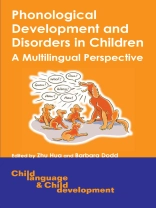This book critically examines the effects of language specificity on phonological acquisition and disorder through a collection of empirical studies of children learning typologically very different languages. The studies address many theoretical, clinical and methodological issues, such as: What role do developmental universals and the ambient language play in language acquisition? How should one account for the similarities and differences in the phonological development between normally and atypically developing children, between monolingual and bilingual children, and between bilingual children sharing one language? What implications do these similarities and differences have for clinical assessment and diagnosis? The book provides much-needed baseline information for clinical assessment and diagnosis.
Spis treści
Part 1: Introduction
1. A Multilingual Perspective on Phonological Development and Disorders – Zhu Hua (Univ. of Newcastle upon Tyne, UK) and Barbara Dodd (Univ. of Queensland)
2. The Need for Comparable Criteria in Multilingual Studies – Zhu Hua
Part 2: Monolingual Context
3. English Phonology: Acquisition and Disorder – Barbara Dodd, Alison Holm (Univ. of Queensland), Zhu Hua (Univ. of Newcastle upon Tyne, UK), Sharon Crosbie (Univ. of Queensland) and Jan Broomfield (Middlesbrough Primary Care Trust, UK)
4. Evidence from German-Speaking Children – Annette Fox (Europa Fachhochschul e Fresenius, Germany)
5. The Normal and Disordered Phonology of Putonghua (Modern Standard Chinese)-Speaking Children – Zhu Hua
6. Cantonese Phonological Development: Normal and Disordered – Lydia So (Univ. of Hong Kong)
7. Phonological Development of Maltese-Speaking Children – Helen Grech (Univ. of Malta)
8. Syllabic Constraints in the Phonological Errors of Children with Pre-lingual Hearing Loss: A Perspective from Telugu – Duggirala Vasanta (Osmania Univ. India)
9. Phonological Development and Disorders: Colloquial Egyptian Arabic – Wafaa Ammar (Univ. of Alexandria) and Ranya Morsi (Univ. of Reading, UK)
10. Phonological Acquisition and Disorders in Turkish – Seyhun Topbaş (Anadolu Univ., Turkey) and Mehmet Yavaş (Florida International Univ.)
Part 3: Bilingual Context
11. Aspects of Bilingual Phonology: The Case of Spanish-English Bilingual Children – Mehmet Yavaş (Florida International Univ.) and Brian Goldstein (Temple Univ.)
12. Phonological Development and Disorder of Bilingual Children Acquiring Cantonese and English – Alison Holm and Barbara Dodd
13. Phonological Acquisition in Bilingual Pakistani Heritage Children in England – Carol Stow and Sean Pert (Rochdale Primary Care Trust, UK)
14. Phonological Development and Disorder of Bilingual Children Acquiring Welsh and English – Martin Ball, Nicole Mueller (Univ. of Louisiana at Lafayette) and Siân Munro (Univ. of Wales Institute, Cardiff)
15. Phonological Acquisition by Arabic-English Bilingual Children – Ghada Khattab (Univ. of Newcastle upon Tyne, UK)
16. Phonological Development of Cantonese-Putonghua Bilingual Children – Lydia So and Samuel Leung (Univ. of Hong Kong)
Part 4: Coda
17. Towards Developmental Universals – Zhu Hua and Barbara Dodd
References
Appendix
Index
O autorze
Barbara Dodd is retired, holding Honorary Professorships at the Universities of Queensland, Melbourne, Curtin, and Charles Sturt in Australia. She continues to collaborate on research projects and supervises postgraduate students. Her recent research concerns the nature, assessment, and treatment of articulation and phonological impairments in children. Current treatment case studies are evaluating a novel intervention approach for toddlers with phonological disorder and analyses of cohort data are identifying types speech impairments that fail to resolve by seven years.












